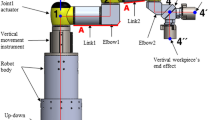Abstract
The role of the robot actuator is transferring execution power in prescribed manner for a desired motion, so that a working mechanism can realize required positioning (in handling or technological operations) with specified accuracy and speed. A suitable choice of the actuator depends not only on its mechanical parameters, but also on sensing and control. Performance data of actuators from various manufacturers are comparable, the difference between them being mostly due to their design. The reported research is part of a project in which it was necessary to design and implement accurate reducers and actuators in various modular kinematic solutions. These modules should be possibly stacked in desired shapes, allowing them to be deployed in production machines and robotic equipment according to specific customer requirements, such as technological heads. The paper describes the design and FEM analysis of technological heads for 2-axis handling and robotic systems.
Access this chapter
Tax calculation will be finalised at checkout
Purchases are for personal use only
Similar content being viewed by others
References
Yang, G., Chen, I.M.: Task-based optimization of modular robot configurations: minimized degree-of-freedom approach. Mech. Mach. Theor. 35(4), 517–540 (2000)
Semjon, J., Janos, R., Tuleja, P. and V. Balaz.: Procedure selection bearing reducer twinspin for robotic arm. Appl. Mech. Mater. 245, 261–266, ISSN 1660-9336 (2013)
Semjon, J. et al.: Benchmarking analysis of the application of small bearing reducers and actuators in service robotics. Fascicle Manag Technol Eng 5.303–5.306, University of Oradea, Romania, ISBN 1583-0691 (2011)
Semjon, J., Varga, J. and P. Tuleja: Comparing the parameters of positioning actuators used for robots, In: DAAAM International Scientific Book 2014, Vienna : DAAAM International, 615–624, ISBN 978-3-901509-98-8, ISSN 1726-9687 (2014)
Wedle, A., et al.: DLRs dynamic actuator module for robotic space applications. In Proceedings of the 41st Aerospace Mechanisms Symposium, Jet Propulsion Laboratory, Robotics and Mechatronics Center (RMC), German Aerospace Center (DLR), Wessling, Germany May 16–18 (2012)
Hajduk, M. et al.: Trends in industrial robotics development. Appl. Mech. Mater. 282, 1–6, ISSN 1660-9336 (2013)
Acknowledgments
The reported work represents a research contribution is the project “Aplikovaný výskum systémov inteligentnej manipulácie priemyselných robotov s neorientovanými 3D objektmi”, related to the activities 1.3 and 2.1 (ITMS: 26220220164). This project was supported by the Research and Development Operational Program funded by ERDF.
Author information
Authors and Affiliations
Corresponding author
Editor information
Editors and Affiliations
Rights and permissions
Copyright information
© 2016 Springer International Publishing Switzerland
About this paper
Cite this paper
Semjon, J., Vagas, M., Balaz, V. (2016). Static Analysis of Rotary Positioning Modules for Technological Head of the Robot. In: Borangiu, T. (eds) Advances in Robot Design and Intelligent Control. Advances in Intelligent Systems and Computing, vol 371. Springer, Cham. https://doi.org/10.1007/978-3-319-21290-6_28
Download citation
DOI: https://doi.org/10.1007/978-3-319-21290-6_28
Published:
Publisher Name: Springer, Cham
Print ISBN: 978-3-319-21289-0
Online ISBN: 978-3-319-21290-6
eBook Packages: EngineeringEngineering (R0)




